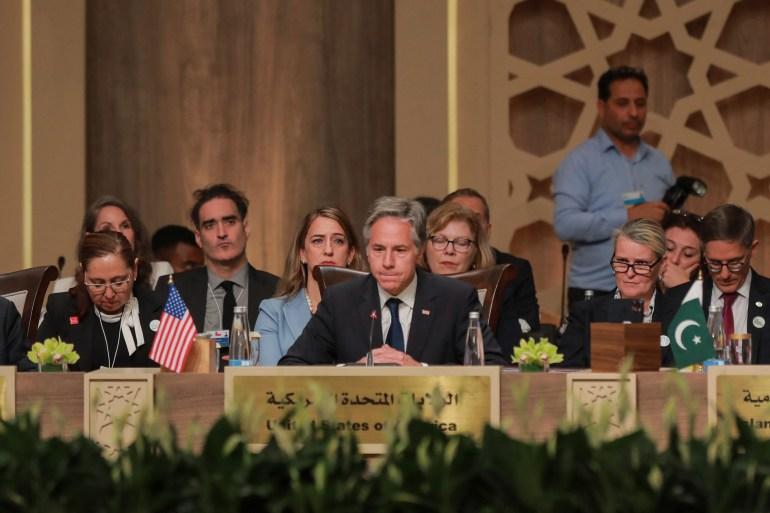Source: ALJAZEERA
ALJAZEERA MEDIA NETWORK

US Secretary of State Antony Blinken promises more aid to Palestinians and attributes the challenges of achieving a truce in Gaza to Hamas.
US Secretary of State Antony Blinken has engaged with key opposition leaders in Israel as the US strives to secure a ceasefire agreement in Gaza.
On Tuesday, Blinken met with Benny Gantz and Yair Lapid in Israel before heading to Jordan for an international Gaza aid conference.
During his discussion with Gantz, Blinken blamed Hamas for the failure to reach a ceasefire agreement.
"They discussed the initiative to attain a ceasefire in Gaza as part of a hostage release deal that would ensure the liberation of all captives and increase humanitarian aid across Gaza," stated the State Department regarding their meeting.
Gantz, who resigned from Israel’s war cabinet and joined the opposition recently, is viewed as Prime Minister Benjamin Netanyahu’s primary competitor within the country.
It is uncommon for the US chief diplomat to meet opposition figures during foreign visits, although Blinken has previously met Gantz and Lapid several times in Israel.
These discussions occur as the Biden administration expresses growing frustration with Netanyahu over his Gaza policies.
In March, top US figures, including Blinken and Vice President Kamala Harris, also met with Gantz in Washington, DC, which some analysts interpreted as sending a message to Netanyahu.
US officials have been urging Netanyahu's government to formulate a post-conflict plan for Gaza without success.
After months of opposing a permanent ceasefire in Gaza, the US now seeks to end the conflict.
Last month, President Joe Biden introduced a multiphased American proposal aimed to bring a lasting end to the Gaza war, which has claimed over 37,000 Palestinian lives.
While US officials maintain that Hamas is the sole obstacle to the deal, Netanyahu has vowed to continue the Gaza conflict until Hamas is eradicated.
Blinken, who met with Netanyahu on Monday in Jerusalem, informed reporters that the Israeli PM had reiterated his support for the US-backed ceasefire proposal.
Netanyahu has not publicly accepted the ceasefire proposal, while other right-wing cabinet members have outright rejected it, threatening to topple the government if the deal proceeds.
Hamas has stated it is responding "positively and constructively" to the proposal while demanding Israel's firm commitment to a lasting ceasefire.
The group has a non-negotiable stance that it will not agree to anything that doesn't include a complete Israeli withdrawal from Gaza and an end to the offensive.
On Monday, the United Nations Security Council passed a resolution calling for an "immediate, full and complete ceasefire" based on the US plan.
The proposition includes three phases: a six-week truce with an exchange of some Israeli captives in Gaza for Palestinian prisoners held by Israel, potential renewal for further negotiations, the return of all captives, the withdrawal of Israeli troops, and efforts to rebuild Gaza.
Hamas welcomed the Security Council's ceasefire resolution on Monday. "Hamas underlines its readiness to work with the mediators to start indirect talks on implementing these principles consistent with our people's demands and resistance," the group stated.
Nonetheless, at the aid conference in Jordan on Tuesday, Blinken urged regional nations to pressure Hamas to accept the plan.
The US diplomat stressed the humanitarian crisis in Gaza, announcing $404m in new aid to Palestinians.
"Most of Gaza’s sanitation infrastructure is destroyed. Fewer than 12 of Gaza’s 40 hospitals are functional. Moreover, more than 270 humanitarian workers have perished," noted Blinken.
Marwan Bishara, Al Jazeera's senior political analyst, described Blinken's remarks as "surrealistic".
"There is an unusual element in hearing an American secretary of state recount Gaza's devastation – the destruction of hospitals, schools, and entire families – as if these were not caused by American weaponry," said Bishara. "It’s as if the US hasn’t blocked every immediate and permanent ceasefire attempt for the past eight months."
Your email address will not be published. Required fields are marked *